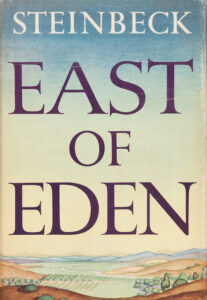Don’t just think about it – how thoughts can be life’s actions
by Mika Provata-Carlone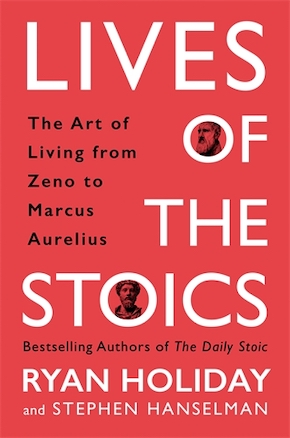
“Indispensable to anyone who genuinely wants to learn about Stoic philosophy.” Donald Robertson
The ancient Greeks, and the Romans in their wake, loved to think. They were enchanted, startled and astonished by the world around them, not only by its wondrousness, but also by its terrifying vastness, inscrutable perils, its dark mysteriousness and unknowingness. They found a sense of thrill and exaltation in the perusal of magnitude and smallness, the natural, the unnatural and the supernatural alike. They pored into the depths of oceans or the human psyche, the heights of Olympian realms or the stars. They were both enthralled and bewildered by the intricate mechanics, the impenetrable workings of the universe. They sought understanding, and have left us with invaluable (even if often bemusing) descriptions of their meandering or dazzlingly lucid paths to wisdom, above all with a meta-critical insight: namely, that no true knowledge can be prescription. That it can only have value as a vital, ongoing conversation, a dialectics of a life of the mind, of a life that acquires fundamental awareness, purpose, meaningfulness and consciousness through the human intellect in its broadest, most ecumenical and humanising (and self-effacing) sense. For the Greeks, and also for the Romans, human understanding can only grow in time, as part of a tradition of inquiry, of cultural belonging and of self-questioning; through the critical encounter with others, and in a continuum of reflective redefinition.
Direct heirs to the discursive tradition of the pre-Socratics, Socrates himself and Plato, as well as Aristotle and the Neoplatonists, the Stoics exemplify this pursuit of both the via contemplative and the via active in both words and deeds. According to Ryan Holiday and Stephen Hanselman, they constitute sublime paradigms especially of the latter, and they are the subject of their new, pugnacious, even if at times somewhat baroque new book, Lives of the Stoics: The Art of Living from Zeno to Marcus Aurelius. This offers a combative thesis on why the Stoic worldview can be a vital soundbite in our current cacophony of muddled ratiocinations. More than their words, it is their lives that must make us pause and take stock of our own existence: “The only reason to study philosophy is to become a better person. Anything else, as Nietzsche said, is merely ‘a critique of words by means of other words’… No school of thought believed… in the power of deeds over ideas more than Stoicism, an ancient philosophy that dates to Greece in the 3rd century” and would last at least until the time of Marcus Aurelius some 500 years later.
Such a direct opening statement is radical indeed, a battle-cry for new starts and an age-old soundness of judgement.”
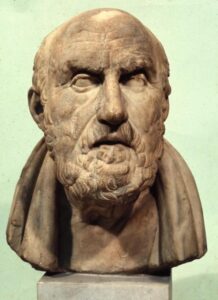
Marble bust of Chrysippos – Roman copy of a Greek original of the late 3rd or 2nd century BC. British Museum
At a time when the love of understanding (from philò – I love, and sophia – wisdom) through a reflected engagement with voices and cultures past and present, when the very notion of intelligence or culture (Nietzsche, certainly) are seen by some as controversial, such a direct opening statement is radical indeed, a battle-cry for new starts and an age-old soundness of judgement. Most importantly, it is full of that dialectics of promise and of questioning on which so much of who we are, what we have striven to be across the history of humanity depends.
The Stoics took their name from a famous arcade in Athens, called the Poikele Stoa, a place where high art and daily, ordinary life rubbed shoulders and oftentimes butted heads. Virgil would make it, together with most elements of Greek intellectual influence, the target of a new animus and suspicion, recasting it as the topos of Dido’s decadence and dangerous allure, yet he would ultimately fail to cast out the philosophers from the Roman Res Publica. Philosophy in Greece (perhaps slightly less so in Rome) was not a pastime of retiring sages or of exclusive coteries of ivory-tower intellectuals. It was the stuff and substance of the marketplace, the talk in the street. Ideas mattered as much as potholes or the price of fish and grains, and their purpose was not the edification of the single man or woman in isolation, but the paideia of thinking individuals, who would be members of a society, and whose aim would be the public (common) good. O tempora, o mores of course played its part in the proceedings and in the definition of each and every variable of the sociohistorical equation, but the facts cannot be ignored, as Holiday and Hanselman insist throughout: for all its warts and blind-spots, its peccadilloes or more consequential, grave failings, the efforts of ancient philosophy, and Stoicism in particular, were consciously concerned with nurturing the goodness in human nature, with defining the parameters of a better human society, with identifying the discerning criteria of justice, happiness, political integrity, the value of humanity, the steps towards true humanisation.
Each head of the Stoa would put a different emphasis on the meaning, purpose and grounding of this philosophical exploration of eudaimonia, the good and happy life. After Zeno’s tripartite analysis via physics, logic and ethics, Ariston would exclude physics and logic to prioritise ethics, whereas Herillus would conversely single out knowledge, effectively dismissing moral action. A ‘normalisation’ of Stoic doctrine, or at least its pivotal principles (moral courage, equanimity of the soul, justice and the pursuit of true understanding), would come with Chrysippus. As Greece and the Hellenistic world became subsumed into the Roman Imperium, the living tradition of Stoicism would create an organic, ever-active fusion between polymorphy, multicultural experience, and a distinct cultural and sociohistorical identity. The finest minds and lives amongst the Romans would be marked indelibly by the train of thought, the analytical narrative of the worth of human life that had started with Zeno in a corner of Athens, as part of that city’s examination of itself. Those who ignored the power of Stoicism to change and sustain at the same time, who suppressed or sought to silence its philosophers, did so at their peril, even if lives were stoically lost or brutally destroyed in the process.
Stoicism fostered both subsistence and resistance. Its proponents were traditionalist mavericks, highly radical conservatives, proactive and reactionary conventionalists.”
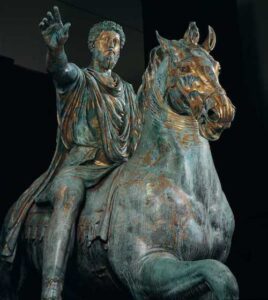
Equestrian statue of Marcus Aurelius, 161–180 AD. Musei Capitolini, Rome
The Stoics, from start to finish (and that ‘finish’, as the authors show, must be seriously contested), faced up to the increasing precariousness of human experience in an almost quantum-theoretical fashion: absolute uncertainty exists and must be espoused, for it is beyond our control, but so do laws governing the minutiae within the sphere of human will and action. There are things that are up to us (eph’emin) and those that are beyond us (ouk eph’emin) and true wisdom lies in mastering the superbly fine balance between the two. To acknowledge this macro- and micro-scopic perspective into human existence allowed for a political theory, a social science and a behavioural analysis that acknowledged the space for both conviction and doubt, for faith in the human intellect and especially in human nature, and for an acceptance of our membership in, rather than dominion over the cosmos.
Stoicism fostered both subsistence and resistance, it created a context for reflection, for reflected action, for actions that reflect our humanity. Its proponents were traditionalist mavericks, highly radical conservatives, proactive and reactionary conventionalists. They were bees in society’s bonnet, certainly gadflies to those at its helm. According to Seneca, their philosophy offered humanity necessary counsel. It created a culture of reflection, a practice of dialectics, and an ethos of self-examination. As Holiday and Hanselman emphasise, both explicitly and tacitly, the Stoics stood for a culture of culture and a system of values that we should restore and cherish, redress if they have gone awry, but not discard or cast out in the spasmodic attempt to erase our own human limitations or the errors that make us more knowing. Their book, gossipy and provocatively thoughtful in turns, is an ode to the humanities for the wisdom, historical connectedness, the intellectual and deep human connectivity they can help us create – or rather reinstate, if we are wise enough.
Each chapter deals with one philosophic life, after the model of Diogenes Laertius’ Lives of Eminent Philosophers, Plutarch’s Parallel Lives, or other ancient anthologies of prominent exemplary biographies. In this, the authors play a clever conceptual game with the word and essence of biography as a genre, as an act of critical memory and as a memorialising gesture: it is the living itself that is the written record that endures, rather than the writing of a life, or the transcriptions of the ideas that sustained it. There is an emphasis on contemporising and diachronicity, which can be especially thrilling when the authors pick out what could be unsuspected connections, parallels, influences, concordances or correspondences, even reincarnations, such as John Steinbeck’s embedment of Stoicism in East of Eden, David Hume’s reimagining of philosophical becoming in his Dialogues Concerning Natural Religion, the impact of Stoicism on Christian thinkers and the development of Christianity, or the centrality of manuals on how to be alive, such as Epictetus’ Encheiridion or Marcus Aurelius’ Meditations, for starkly different, even diametrically opposed more contemporary lives.
The Roman history that emerges from this narrative survey of lives and their times is one of unbridled political ambition, butchery and formidable intellects. It provides a perfect foil for the Stoic values of apatheia, or the ability to maintain one’s balance in a turmoil; euthymia, or “the well-being of the soul”; oikeiosis, the fundamental understanding “that we share something” as human beings and in a society of others, and “that our interests are naturally connected to those of our fellow humans”; clementia, or the obligation to empathise, sympathise, contextualise our judgement in accordance with the limitations of our own mortality – and mayhap innocence. Political analysis, in its ineluctable diachronicity and critical ever-presence is key to the book’s argument and narrative angle. The Stoics emerge as the active political agents of their time, as opposed to politicised activists of any time, and especially against populists left and right: “the populist irony [is that] the strongman comes to power by making impossible and destructive promises to the disenfranchised”, whom they incite to feelings of indignation and discontent with a single – anti-people – purpose: to consolidate “their iron grip on their ignorant base and the power that comes from it.” The authors are, of course, referring specifically to ancient Rome.
Lives of the Stoics is neither a history of philosophy nor a philosophical manual; it is an almost ad-lib exploration of historical becoming and of the evolution of our human understanding.”
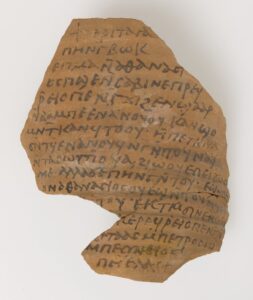
Ostrakon with a Letter from Pesynthius to Peter, c. 580–640 AD. Metropolitan Museum of Art
The Stoics are presented as the people’s philosophers, educators as much as radical reformers and conservators. At 300+ pages, the story sometimes sags and trails, yet the telling of it is invariably worth it, for all the not always pertinent (or valid) digressions and associative tangentials, the at times disorienting zoomings in and out of social and philosophical history and private (or not so private) lives. There are also some significant weak points: one is the ambiguity regarding Sulla and Augustus, who are allowed to slink past while Julius Caesar takes the full thrust of historical forensics and inductive historical causation. Another is the disingenuous slide between ancient and modern Middle Eastern geo-reality and toponymy, the elision of the Hellenic identity of the cities where Stoicism flourished. There is also a reliance on English translations of ancient texts or on secondary criticism, rather than a stricter focus on the primary literature at its source, which can lead to comic or not so comic conceptual wobbles: Cleanthes did not record Zeno’s teachings on “oyster shells”, even though many translations do claim so. The Greek word, used by Diogenes Laertius, is ostraka, which can mean both seashells and pottery shards. Writing on broken pieces of pottery was a common practice for voting in the people’s assembly in Athens, especially on questions of exile, whence we have the term to ostracise. It was on pottery shards that Cleanthes wrote, not oyster shells, although the skill to write on the latter might have been something he would have been proud of! Oysters were also unlikely to have been as cheap as olives in ancient times, which would have run contrary to Stoic frugality. Broken pots, however, there were aplenty… Holiday and Hanselman also cite Robert Kaster to argue that “there was no Greek word for clemency… what one does with power”. The Greek word was eleos, and its meaning extended to include a deified personification to which the Greeks built altars so as to remember their duty to their own and fellow humanity. Statius in the Thebaid describes the altar of Eleos in Athens as the altar of Clementia, thus evincing the Roman knowledge of the Greek antecedent and its equivalence. Interestingly, most key Stoic terms were transliterations of the Greek originals.
Lives of the Stoics is neither a history of philosophy nor a philosophical manual; it is rather a combination of a thinking process at hand’s reach, and an almost ad-lib exploration of historical becoming and of the evolution of our human understanding. It is intentionally vernacular, almost unrevised in style, as if in a state of evolving unfinishedness, as though intended to invite instinctive responses, a live and living dialogue. It is the dialogue the authors see as central, quintessential and utterly mesmeric in the Stoics themselves, in their own engagement with their times, the times before them and after them, in a thriving, never static, yet distinct continuum. Writing of Marcus Aurelius’ sense of affinity with Epictetus, they offer a particularly incisive analysis of the give and take, the over and under that it takes to think, to respond, to construct rather than destroy a process of being and of understanding: “It is a striking contrast, an emperor and a slave sharing and loving the same philosophy, the latter figure greatly influencing the former, but it is not a contradiction – nor would it have seemed odd to the ancients. It’s only in our modern reactionary, divisive focus on ‘privilege’ that we have forgotten how much we all have in common as human beings, how we all stand equally naked and defenceless against fate, whether we possess worldly power or not. [We are all] assigned difficult roles by the author of the universe”, and sometimes the challenge is not perhaps how to deny or resist these roles, but how to define them, transform them into opportunities of positive agency that can truly make a difference. One of the finest quotations comes from Marcus Aurelius, deemed the last perhaps of the Stoics and the first true philosopher king: “when jarred, unavoidably, by circumstances, revert at once to yourself, and don’t lose the rhythm more than you can help. You will have a better grasp of harmony if you keep going back to it.” “Keep going back”, perhaps, if you want to go forward?
 Ryan Holiday is a strategist and writer whose company Brass Check has advised clients like Google, TASER and Complex, as well as many prominent authors. He is the bestselling author of Growth Hacker Marketing, The Obstacle is the Way and Ego is the Enemy. His books have been translated into 25 languages and his writing has appeared everywhere from the Columbia Journalism Review to Fast Company. He lives on a small ranch outside Austin, Texas.
Ryan Holiday is a strategist and writer whose company Brass Check has advised clients like Google, TASER and Complex, as well as many prominent authors. He is the bestselling author of Growth Hacker Marketing, The Obstacle is the Way and Ego is the Enemy. His books have been translated into 25 languages and his writing has appeared everywhere from the Columbia Journalism Review to Fast Company. He lives on a small ranch outside Austin, Texas.
ryanholiday.net
 @ryanholiday
@ryanholiday
Stephen Hanselman has worked for over three decades in publishing as a bookseller, publisher and literary agent. He received a Master’s degree at Harvard Divinity School, while also studying at Harvard’s philosophy department.
@SteveHanselman
Lives of the Stoics is published in hardback, eBook and audio download by Profile Books, who also publish Holiday and Hanselman’s The Daily Stoic and The Daily Stoic Journal.
Read more
@ProfileBooks
Mika Provata-Carlone is an independent scholar, translator, editor and illustrator, and a contributing editor to Bookanista. She has a doctorate from Princeton University and lives and works in London.
bookanista.com/author/mika/

